You might look at an eggshell and see nothing more than a fragile casing, something to be discarded. But for me, a longtime chicken keeper, I see potential. That discarded shell could be a valuable resource, serving as a nutrient-rich supplement for the very hens that produced it. That brings us to a curious question: can chickens eat egg shells? The short answer is yes, they can, and it can benefit them.
In the world of chicken keeping, feeding eggshells back to our feathery friends is a bit of a hot topic. It sparks debates and is shrouded in myths, misconceptions, and valid concerns. Some chicken keepers swear by it, asserting it’s a fantastic source of calcium. Others fret that it may encourage harmful egg-eating behavior among the flock.
This article will navigate the maze of truths, semi-truths, and plain old myths around chickens eating eggshells. We’ll explore why calcium is critical in a chicken’s diet, how eggshells can provide it, and how to feed them back to the flock. Whether you’re a seasoned chicken keeper or a newbie in the poultry world, this guide aims to give you clear, evidence-based insights about chickens and their potential eggshell diet.
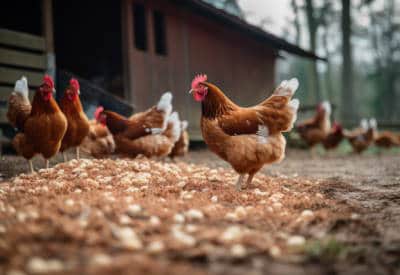
Understanding Chicken Nutrition
Like every other living creature, chickens require a balanced diet to stay healthy and productive. The nutritional needs of these birds are as varied as they are specific.
Essential Nutrients for Chickens
Protein, carbohydrates, fats, vitamins, and minerals contribute to a chicken’s well-being. They need protein for growth and feather production, carbohydrates for energy, and fats for energy and cellular functions. Vitamins and minerals, meanwhile, serve various purposes, from bone development to immune support.
Importance of Calcium in a Chicken’s Diet
One mineral that holds particular importance in a chicken’s diet is calcium. It is crucial for bone health, but perhaps most notably, hens require substantial calcium to produce eggshells. If hens don’t get enough calcium, their egg production could be adversely affected, and the shells of the eggs they lay may be unusually thin and fragile.
How Chickens Typically Consume Calcium
In commercial settings, chickens often get their calcium from a specially formulated feed. However, in backyard coops or organic farms, keepers may opt for natural sources of calcium, and eggshells can be one such source.
[ChickenAffiliate]
Eggshells as a Source of Calcium
The miracle of life lies in nature’s recycling ability, which also holds true for the chicken’s diet. The eggshells that once protected the embryos can return to the cycle as a vital source of nutrients.
Composition of Eggshells
Eggshells are primarily made up of calcium carbonate. About 95% of an eggshell’s dry weight is calcium carbonate, which makes them a rich potential source of dietary calcium.
Calcium Content in Eggshells
One eggshell can provide a substantial amount of the daily calcium a chicken requires. However, the amount of calcium can vary depending on factors such as the age and breed of the hen.
Comparing Eggshells to Other Calcium Sources
While there are other natural and commercially available sources of calcium, eggshells often have the advantage of being readily available and cost-effective, especially for those who already keep chickens.
Can Chickens Eat Their Own Eggshells?
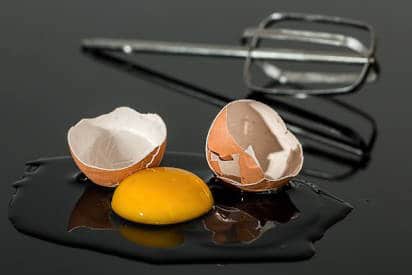
Despite the common perception that feeding chickens their own eggshells could encourage egg-eating behavior, there is a wealth of evidence suggesting otherwise.
Myths About Chickens Eating Their Own Eggshells
One persistent myth is that giving eggshells to chickens can lead to egg-eating, a troublesome behavior where chickens start eating their own eggs. However, this is generally not due to feeding them eggshells but rather to poor nesting conditions or inadequate nutrition.
Scientific Evidence Supporting Eggshell Consumption
Several studies have shown that chickens can safely eat eggshells and benefit from the calcium they provide. These studies suggest that eggshell consumption can help maintain strong egg production and contribute to shell quality.
Potential Health Effects of Eating Eggshells
Feeding chickens eggshells should not pose any significant health risks if done properly. However, preparing the eggshells correctly is essential to avoid any potential health hazards.
Preparing Eggshells for Chickens
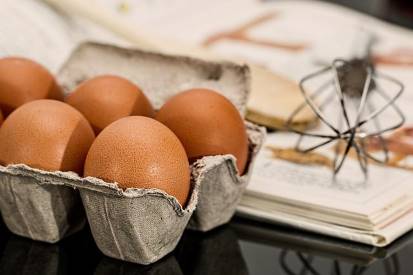
Feeding chickens their eggshells is not as simple as tossing them some leftover shells. The process requires some preparation to ensure they’re safe to eat.
Proper Ways to Clean Eggshells
Before giving eggshells to your chickens, they need to be cleaned thoroughly. This usually involves rinsing and baking them in an oven to kill off potential pathogens.
How to Crush Eggshells for Feeding
After cleaning, eggshells should be crushed into small pieces. Chickens do not recognize crushed eggshells as eggs, which helps avoid encouraging egg-eating habits.
Storing Prepared Eggshells for Future Use
Prepared eggshells can be stored in a cool, dry place for future use. Proper storage will ensure that the eggshells remain fresh and safe for consumption.
Introducing Eggshells to the Chicken’s Diet
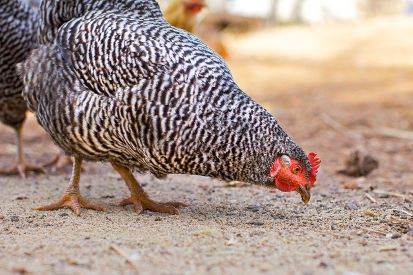
With the right preparation, eggshells can be a great addition to your chickens’ diet. However, it’s important to monitor their response and adjust as needed.
When to Start Giving Eggshells to Chickens
Chickens usually start laying eggs around five to six months of age, when their need for dietary calcium increases. This is a good time to start incorporating eggshells into their diet.
How Often Should Eggshells be Given to Chickens
It’s generally recommended to offer eggshells as a free-choice supplement, which means chickens can eat as much or as little as they need. This practice ensures they have continuous access to the calcium they require.
Monitoring Your Chickens’ Health and Behavior After Introducing Eggshells
Even though eggshells are generally safe, it’s important to observe your chickens for any behavior or egg production changes after introducing eggshells into their diet. Any adverse changes may indicate the need for a diet adjustment.
Other Natural Sources of Calcium for Chickens
While eggshells are a valuable source of calcium, they aren’t the only one. Offering a variety of sources can help ensure a well-rounded diet.
Benefits and Drawbacks of Different Calcium Sources
Each calcium source has its own set of advantages and disadvantages. Commercial supplements are reliable and easy to administer but lack the natural and sustainable appeal of alternatives like eggshells, oyster shells, and certain green vegetables.
How to Integrate Multiple Calcium Sources into a Chicken’s Diet
A mix of calcium sources can provide a well-rounded supply of this vital mineral. You might offer commercial supplements as the primary source, with natural sources like eggshells and vegetables as supplements.
Case Studies of Successful Calcium-Rich Diets for Chickens
There are numerous examples of chicken keepers successfully using a combination of calcium sources to promote their flocks’ health. By studying these examples, we can learn how to effectively incorporate eggshells and other sources into our own chickens’ diets.
The Environmental Impact of Feeding Eggshells to Chickens
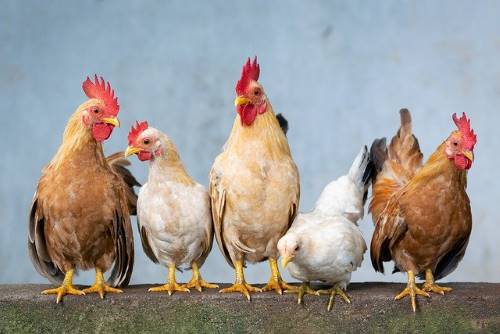
In the face of a rapidly changing climate and heightened environmental concerns, every action we take – no matter how small – can have a significant impact. This includes how we feed our chickens. By recycling eggshells as a calcium supplement, we’re supporting our flock’s health and contributing to a more sustainable world.
Reusing eggshells reduces kitchen waste and lessens the demand for commercial calcium supplements, which are mined and processed and require significant energy input. By feeding our chickens eggshells, we’re closing a natural loop, utilizing what would otherwise be waste, and reducing our carbon footprint – one eggshell at a time. It’s a small but meaningful step towards sustainable chicken keeping.
Dangers of Overfeeding Eggshells
As with anything in life, balance is key. While eggshells can be an excellent source of calcium for your chickens, it’s essential not to overdo it. Overconsumption of calcium can lead to a condition known as hypercalcemia, which could potentially harm your chickens’ kidneys and other organs.
Hypercalcemia often results from a diet that is too high in calcium relative to other nutrients. Signs of this condition can include decreased appetite, lethargy, excessive thirst, and frequent urination. It can lead to kidney stones and other health complications in severe cases.
To prevent this, ensure eggshells or other calcium supplements are in moderation and balance them with a varied, nutrient-rich diet. Providing plenty of clean, fresh water for your flock is crucial, as hydration plays a key role in maintaining healthy calcium levels.
Remember, eggshells should be a supplement to a balanced diet, not a primary food source. And as always, if you notice any unusual behavior or health issues with your chickens, it’s best to consult a veterinarian.
What Unusual Foods Can Chickens Eat?
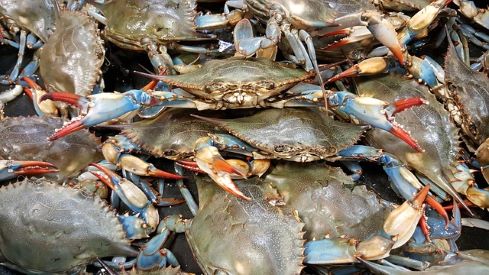
In our journey to understand what makes a chicken’s dietary tick, we’ve covered the basics and even ventured into eggshell territory. But what about some of the more unusual foods? Chickens are known to peck at anything that catches their eye, but is everything fair game? Let’s take a closer look at some of these peculiar items.
Coffee Grounds
Starting with a morning favorite for many of us, coffee grounds might be a surprising addition to this list. Unfortunately, they’re not safe for chickens to consume. Coffee grounds contain caffeine, which can be harmful to chickens. So, keep your spent coffee grounds out of your chicken’s reach.
Read More: Can Chickens Eat Coffee Grounds? The Surprising Truth Revealed
Rocks
Rocks might not seem like food to us, but they’re an essential part of a chicken’s diet! Chickens lack teeth and use small rocks or grit in their gizzard – a part of their digestive system – to grind down food. While they don’t technically “eat” rocks, they swallow small ones for this purpose. However, ensure the rocks are an appropriate size to avoid choking hazards.
Read More: Do Chickens Eat Rocks? Unraveling The Gritty Truth
Moldy Food
While chickens might not turn their beaks up at moldy food, it doesn’t mean it’s safe for them. Mold can produce harmful mycotoxins that can potentially be deadly to chickens. Always provide fresh, high-quality feed and promptly remove any leftovers showing mold signs.
Read More: Can Chickens Eat Moldy Food? Uncovering Facts You Need To Know
Diatomaceous Earth
Diatomaceous earth (DE) is not food but is a substance often found in chicken coops. It’s typically used to control pests like mites and lice. Some chicken keepers even add food-grade DE to their chickens’ dust bath mix. While it’s not harmful if ingested in small amounts, DE should not be a substantial part of a chicken’s diet.
Read More: Can Chickens Eat Diatomaceous Earth? Uncovering The Truth
Crab Shells
Finally, let’s consider crab shells. Crab shells are high in calcium, like eggshells, making them a beneficial supplement for laying hens. However, they must be thoroughly cleaned, cooked, and crushed before being offered to your chickens. This process ensures they’re safe for consumption and easy for your chickens to eat.
Read More: Can Chickens Eat Crab Shells? Simple Answer & Feeding Tips
Can chickens eat egg shells – final thoughts
So there we have it, an egg-ceptional exploration of the question: can chickens eat eggshells? The answer is not just a simple yes but a resounding cluck-yeah! Chickens can not only safely munch on their own eggshells, but they can also benefit from the calcium-rich nutrition these shells provide. By busting the myths, diving into scientific evidence, and guiding you through preparing and introducing eggshells into your flock’s diet, we’ve ensured no eggshell goes to waste!
With a newfound appreciation for eggshells, you’re ready to venture back to your coop, armed with knowledge and a potential new supplement for your feathered friends. Who knew something as simple as an eggshell could stir up such a fascinating discussion?
Related Articles:
